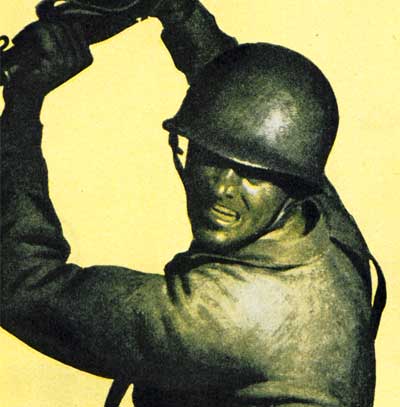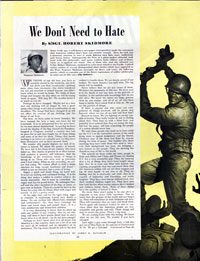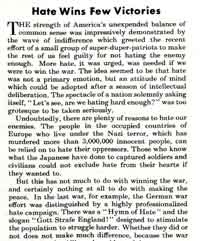As the election season advances and campaign rhetoric gets more heated, candidates will be tempted to make more attention-grabbing statements.
The war on terror is sure to be part of the debate. We can expect candidates’ promises to be more ruthless in preventing terror attacks, while criticizing their opponent for being “weak” on extremists.
Already we’re hearing plans to match the radical Islamists’ barbarity, and attack our enemies, and suspected enemies, with a fury that has never been part of American policy.
History offers us a lesson in the politics of rage. Over the centuries we’ve seen that indulging hatred has consistently failed to achieve long-term success. During the Second World War, for example, when the U.S. was fighting two global powers, some Americans said we needed to hate more to achieve victory.
In a 1943 editorial, the Post editors had an interesting response to this call for hatred. They praised the Americans’ indifference to “the recent effort of a small group of super-duper-patriots to make the rest of us feel guilty for not hating the enemy enough. More hate, it was urged, was needed if we were to win the war.” Hating more, the editors continued, would probably not help America win the war any sooner.
In fact, hating might send the country off in the wrong direction, according Staff Sergeant Hobert Skidmore. Stationed on the war’s front lines, on “a far-away island in the Pacific,” he believed America couldn’t afford the luxury of hatred or vengeful violence.
In his Post article, “We Don’t Need to Hate,” he agreed that anger had its uses. It gave soldiers in combat the courage and strength they needed to achieve the nearly impossible. “But it must be controlled. An angry man has his guard down. He endangers himself and the other members of his ship, or plane, or gun crew or foxhole. There is a word we have in the Army for a guy who is always filled with anger and hatred. It isn’t a pretty word.”
American anger would have been at an all-time high when Skidmore’s article was published. The Japanese had just begun launching kamikaze attacks, pilots flying their explosive-laden aircraft into U.S. war vessels.
But Skidmore cautioned Americans against giving in to hatred: Blind fury was the sign of desperation and impending defeat. And once a nation gave in to savagery, it lost its self-respect, along with its respect for other nations.
|
|
|
Become a Saturday Evening Post member and enjoy unlimited access. Subscribe now






Comments
Americans who disagree with–not “oppose”–the country’s non-wartime policies and, at times, mindless “toleration” of unreasonable accomodation, are hardly “terrorists.”
When those policies are based on an “America-last” premise, you can bet our citizens will rise up in righteous anger.
Anger, not hatred.